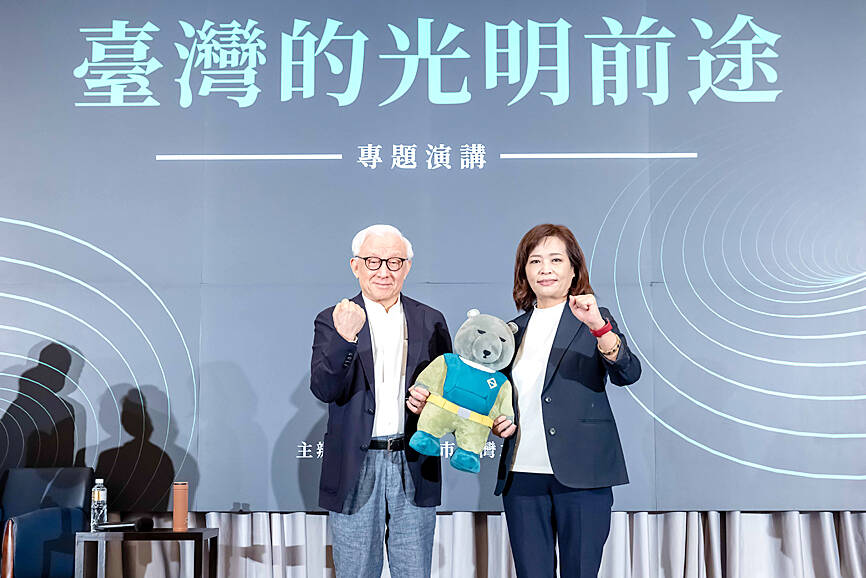Taiwan must remain independent and democratic, Robert Tsao (曹興誠), founder and former chairman of contract chipmaker United Microelectronics Corp (UMC), told an event in Hsinchu City yesterday.
In a speech titled “Taiwan’s bright future,” he said that people might feel depressed amid China’s pressure campaign against Taiwan, Russia’s invasion of Ukraine, inflation and the current soft stock market.
However, the future of the world is bright, he said.

Photo: Tsai Chang-sheng, Taipei Times
The economies of many countries are growing exponentially, there is increasingly less poverty and life expectancy is rising in many countries, while the infant mortality rate is improving, he said, citing data from popular science author Steven Pinker‘s book Enlightenment Now.
Taiwan “must maintain its independence and follow the spirit of Enlightenment Now,” he said.
Protests over an extradition bill in Hong Kong made him realize that “China is a gangster,” he said, adding that everyone should unite to defend Taiwan against China.
A survey conducted by the Guardian showed that half of the respondents believed that other countries should help Taiwan if China attempts to annex it by force, which indicated that China has stirred up hatred against itself across the globe, he said.
“Supporting Taiwan’s independence is befriending the world, while supporting Taiwan’s unification [with China] is making an enemy of the world,” he said.
There are five important values of enlightenment: humanitarianism, rationality and science, technology and industry, wealth created by the division of labor based on expertise, and global trade growth driven by the mechanism of the market, he said.
“Democracy protects human rights,” he said.
While some entrepreneurs believe that “we cannot live on democracy alone,” Tsao said he believes that “life without democracy is difficult to live.”
He implemented the concept of division of labor in the foundry business in 1984, dividing the production of chips into designing, manufacturing and packaging, which contributed to Taiwan’s success in the semiconductor industry, he said.

Taiwan is stepping up plans to create self-sufficient supply chains for combat drones and increase foreign orders from the US to counter China’s numerical superiority, a defense official said on Saturday. Commenting on condition of anonymity, the official said the nation’s armed forces are in agreement with US Admiral Samuel Paparo’s assessment that Taiwan’s military must be prepared to turn the nation’s waters into a “hellscape” for the Chinese People’s Liberation Army (PLA). Paparo, the commander of the US Indo-Pacific Command, reiterated the concept during a Congressional hearing in Washington on Wednesday. He first coined the term in a security conference last

Prosecutors today declined to say who was questioned regarding alleged forgery on petitions to recall Democratic Progressive Party (DPP) legislators, after Chinese-language media earlier reported that members of the Chinese Nationalist Party (KMT) Youth League were brought in for questioning. The Ministry of Justice Investigation Bureau confirmed that two people had been questioned, but did not disclose any further information about the ongoing investigation. KMT Youth League members Lee Hsiao-liang (李孝亮) and Liu Szu-yin (劉思吟) — who are leading the effort to recall DPP caucus chief executive Rosalia Wu (吳思瑤) and Legislator Wu Pei-yi (吳沛憶) — both posted on Facebook saying: “I

The Ministry of Economic Affairs has fined Taobao NT$1.2 million (US$36,912) for advertisements that exceed its approved business scope, requiring the Chinese e-commerce platform to make corrections in the first half of this year or its license may be revoked. Lawmakers have called for stricter enforcement of Chinese e-commerce platforms and measures to prevent China from laundering its goods through Taiwan in response to US President Donald Trump’s heavy tariffs on China. The Legislative Yuan’s Finance Committee met today to discuss policies to prevent China from dumping goods in Taiwan, inviting government agencies to report. Democratic Progressive Party Legislator Kuo Kuo-wen (郭國文) said

The Ministry of Economic Affairs has fined Taobao NT$1.2 million (US$36,900) for advertisements that exceeded its approved business scope and ordered the Chinese e-commerce platform to make corrections in the first half of this year or its license would be revoked. Lawmakers have called for stricter supervision of Chinese e-commerce platforms and more stringent measures to prevent China from laundering its goods through Taiwan as US President Donald Trump’s administration cracks down on origin laundering. The legislature’s Finance Committee yesterday met to discuss policies to prevent China from dumping goods in Taiwan, inviting government agencies to report on the matter. Democratic Progressive Party